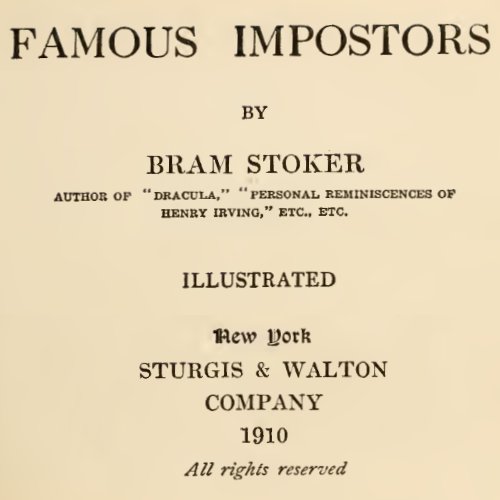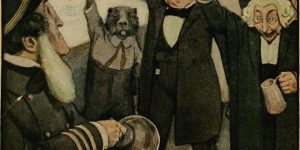Sir Edward Kelley : Famous Impostors by Bram Stoker
Famous Impostors : Witchcraft and Clairvoyance Sir Edward Kelley
by
Bram Stoker
Sir Edward Kelley
Carlyle in his French Revolution makes a contrast between two works of imagination which mark the extremes of the forces that made for the disruption of France, Paul et Virginie and Le Chevalier de Faublas. The former he calls “the swan-song of old dying France”; of the latter he says “if this wretched Faublas is a death-speech, it is one under the gallows, and by a felon that does not repent.” This double analogy may well serve for a comparison of Dr. Dee and the man who was at once his partner for a time, and his evil genius. The grave earnest old scholar, with instincts for good, high endeavour, and a vast intellectual strength, contrasts well with the mean-souled shifty specious rogue who fastened himself on him and leech-like drained him “dry as hay.”
Such historians as mention the existence of the latter are even a little doubtful how to spell his name. This, however, does not matter much—nay, at all, for it is probably not that to which he was born. Briefly the following is his record as far as can be discovered. He was born in 1555 to parents living in Worcester, who having tried to bring him up as an apothecary, sent him to Oxford when he was seventeen years of age. There he was entered at Gloucester Hall, under the name of Talbot. As however three men of that name were in the Hall at the same time, it is doubtful what family can claim the honour of his kinship. His college life was short—only lasting a year—and inconspicuous. “He left,” we are told, “abruptly.” Then, as if to complete the purely educational phase of his existence, he was for a while an attorney, eking out the tenuity of his legal practice by aid of forgery. Thus full-fledged for his work in life, he made his first properly-recorded appearance in the pillory in 1580, for an offence which is variously spoken of as forgery and coining. At any rate his ears were cropped off, a loss which necessitated for prudential reasons his wearing a skullcap for the remainder of his days. This he wore with such conspicuous success that it is said that even Doctor Dee, who was his partner for nearly seven years, did not know of his mutilation. Kelley’s next recorded offence was one which in a later age when subjects for dissection (necessary for purposes of education in anatomy) were difficult to obtain, was popularly known as “body-snatching.” The commission of this offence though a serious breach of the law, came to be regarded as a necessary condition of study; and even if punishment was meted out, it was not looked upon as dishonour. But in Kelley’s case the offence was committed not for the purpose of scientific education but for one of sorcery. It took place in Walton-le-dale in Lancashire, where Kelley dug up a body buried on the previous day, for purposes of necromancy, which, it will be remembered, was, as the etymology of the word implies, divination by means of the dead.
From this time on, he seemed to see his way clear to the final choice of a profession. He had tasted crime and punishment, and considered himself well qualified to accept the risks as well as the benefits; and so chose fraud as his life work. He was still under twenty-five years of age when he began to look about him for his next means or occasion of turning his special talents to profit. After some deliberation he fixed on the existence and qualities of the famous (as he had then become) Doctor Dee, and carefully commenced operations. He called on the mathematician at his house at Mortlake and made his acquaintance. Dee was naturally impressed by the conversation and ostensible qualities of the young man, who had the plausibility of the born rogue and laid himself out to captivate the old man, more than double his companion’s age and worn by arduous study. He fostered all Dee’s natural weaknesses, humoured his fads, was enthusiastic regarding his beliefs which he appeared to share, and urged on his personal ambitions. The belief in occultism which the philosopher cherished in secret, though he had openly and formally repudiated it a dozen years before in his preface to Sir Henry Billingsley’s translation of Euclid, gave the parasitic rogue his cue for further ingratiating himself, and before long he entered Dee’s service at an annual salary of fifty pounds. His special function was that of “skryer,” which was his own or Dee’s reading of “seer.” His contribution to the general result was to see the figures which did—or did not—appear in the so-called “magic” crystal, an office for which his useful imagination, his unblushing assurance, and his utter unscrupulousness eminently fitted him. In fact he was in his designs of fraud a perfect complement of the simple-minded scientist. Of course as days went on and opportunities offered themselves, through Dee’s growing madness and Kelley’s social enlargements, the horizon of chicanery widened. This was largely assisted by the opportune arrival in England of the Palatine Albert Laski in 1583. Laski was just the man that Kelley was waiting for. A rich man with a taste for occult science; sufficiently learned to keep in touch with the theories of occultism of that time; sufficiently vain to be used by an unscrupulous adventurer who tickled his intellectual palate whilst he matured his frauds upon him.
Kelley having worked on Dee’s feelings sufficiently to secure his acquiescence, procured that Laski should be allowed to aid in such operations and experiments as appealed to him. The result was that the Palatine took the two men with him, promising a free field for them both, each according to his bent. At Prague, in 1583, Laski presented Dee and his companion to the Emperor Rudolph II. Encouraged by the royal approval, Dee looked for a longer sojourn in eastern Europe, and brought thither his wife and children from Poland, where he had left them at Laskoe, the seat of the Palatine. Later on, in 1585,—again through the influence of the credulous Laski—Dee with his companion was presented to Stephen, King of Poland. Stephen was much interested, and attended a séance that he might see the spirits of which he had heard so much. He saw too much, however, as far as Kelley was concerned, for he penetrated the imposture. Thereupon Kelley, unequal to carrying on the business single-handed, for he dared not let Dee’s eyes be opened and he knew he could not induce him to be other than a blind partner, contrived that a new confederate should be added to the firm. This was one Francis Pucci, a Florentine, possessed of all the address and subtlety of his race. But after the experience of a year he was removed on suspicion of bad faith. Before that year was out, the Bishop of Piacenza, Apostolic Nuncio at the Emperor’s Court, had a decree issued that the two Englishmen should quit Prague within six days. From Prague they went to Erfurt, in Thuringia; but despite letters of recommendation from high quarters the Municipal Authorities would not allow them to remain. So they moved on to Hesse-Cassel and thence to Tribau in Bohemia, where the fraud of making spirits appear was renewed. In 1586, it was intimated to Dee that the Emperor of Russia wished to receive him in that country. He would receive a fee of two thousand pounds per annum and would be treated with honour; but the scholar did not see his way to accept the flattering offer. At Tribau, Kelley experimented, but unsuccessfully, with some powder found at Glastonbury, Dee’s young son being the medium. It was noticeable that whenever Dee or his family failed in these experiments, Kelley always succeeded. At this stage Kelley, who was a man of evil life, fell madly in love with Dee’s wife. He was married himself, but that did not seem to matter. His own wife was ugly and unattractive, whereas the second Mrs. Dee was well-favoured and winning. In the madness of his lust he tried to work on the husband’s credulity by telling him that it had been conveyed to him through angels that it was the Divine wish that the two men should hold their wives in common. Dee was naturally sceptical and annoyed, and his wife was furious. Kelley, however, was persistent, and stuck to his point so stedfastly that after a while the woman’s resolution began to give way, and for a time some sort of working arrangement came about. Kelley’s story, as elaborated to his partner, was that at Tribau, in 1587, the crystal showed him a vision of a naked woman who conveyed to him the divine message. To Dee’s unhinged mind this seemed all natural and correct—probably even to the suitable costume adopted by the angelic messenger: so the worthy doctor gave way. After a time however the matron recovered her sanity, and the vulture and the pigeon parted. Dee gave up to his late partner all the “tools of trade” and “properties” of the fraud, and the two never met again.
Kelley went to Prague where he was thrown into prison in 1589. He remained in durance for four years after which he was released. From thence on till 1595, he became a vagabond as well as a rogue, and wandered about Germany. He again fell into the hands of Rudolph, to be again imprisoned by him. He was killed whilst making a desperate effort to escape.
There seems to be no record of Edward Kelley—or Talbot—having been knighted, no authority save his own wish for the use of the title. It may of course be possible that he was knighted by the Emperor in some moment of absurd credulity; but there is no record of it. He had no children.
Famous Impostors
Chapter I. Pretenders
A. Perkin Warbeck
B. The Hidden King
C. Stephan Mali
D. The False Dauphins
E. Princess Olive
Chapter II. Practitioners of Magic
A. Paracelsus
B. Cagliostro
C. Mesmer
Chapter III.
The Wandering Jew
Chapter IV.
John Law
Chapter V. Witchcraft and Clairvoyance
A. Witches
B. Doctor Dee
C. La Voisin
D. Sir Edward Kelley
E. Mother Damnable
F. Matthew Hopkins
Chapter VI.
Arthur Orton (Tichborne claimant)
Chapter VII. Women as Men
A. The Motive for Disguise
B. Hannah Snell
C. La Maupin
D. Mary East
Chapter VIII. Hoaxes, etc.
A. Two London Hoaxes
B. The Cat Hoax
C. The Military Review
D. The Toll-Gate
E. The Marriage Hoax
F. Buried Treasure
G. Dean Swift’s Hoax
H. Hoaxed Burglars
I. Bogus Sausages
J. The Moon Hoax
Chapter IX.
Chevalier d’Eon
Chapter X.
The Bisley Boy











